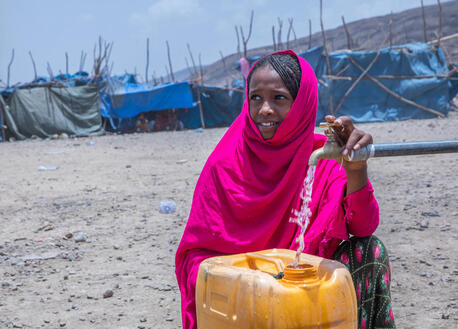
UNICEF Report: The Climate-Changed Child
UNICEF provides updated insights into various threats to children’s health and well-being caused by climate change — with a special focus on water scarcity — and issues recommendations for action in advance of COP28.
Summary
The climate crisis is not just changing the planet, it is changing children.
From the moment of conception until they grow into adulthood, the health and development of children’s brains, lungs, immune systems and other critical functions are affected by the environment they grow up in.
And climate change knows no borders. Children everywhere – even in high-income countries – are affected by it. Their bodies and minds are uniquely vulnerable to pollution, deadly diseases and extreme weather. They are disproportionately affected by the impacts of disasters, environmental degradation.
And the world is not doing nearly enough to protect them.
In a new report entitled "The Climate-Changed Child," a supplement to the 2021 Children's Climate Risk Index report, UNICEF takes a closer look at how the climate crisis is exposing children everywhere to more frequent and intense climate hazards — making water scarcity worse across regions — and how extreme weather is also straining water, sanitation and hygiene services globally, threatening children's health, safety and well-being.
According to the report, 1 in 3 children — or 739 million worldwide — live in areas exposed to high or very high water scarcity.
The report also makes the point that, despite the unique vulnerabilities of children to the crisis, their needs and perspectives are almost totally absent in climate policies, action and investment at all levels. Only 2.4 per cent of climate finance from key multilateral climate funds support projects incorporating child-responsive activities.
The COP28 Climate Conference is a critical juncture in the fight against the climate crisis — and the fight for children’s rights and futures. UNICEF calls on world leaders and the international community to ensure that child rights are prominent within the key outcomes of COP28, so that children's needs are respected, promoted and considered in all aspects of climate action.
Beyond COP28, UNICEF calls on governments to take action that:
- protects children and the resilience of their communities by adapting essential social services to a changing climate, more frequent disasters and degrading environment
- empowers every child through their life course with the developmental opportunities, education and skills to be a champion for the environment
- reduces emissions and fulfills ambitious international sustainability and climate change agreements
Read our story for more about this report's key takeaways and UNICEF's plans going into COP28.